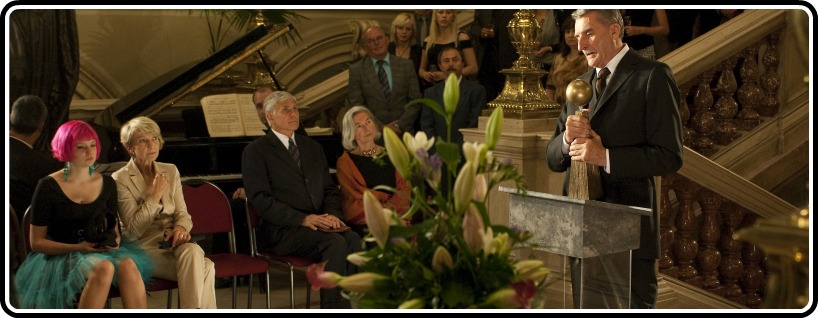Kawasaki’s Rose pulls off a fairly effective rope-a-dope. The Czech film, written by Petr Jarchovskýn and directed by Jan Hrebejk begins on solid ground. Renowned psychiatry professor Pavel Josek (Martin Huba) is being given a humanitarian award honoring his past as an anti-government dissident prior to the Velvet Revolution, the non-violent removal of the Communists in 1989. In advance of the ceremony, the Czech news station is filming a biographical special on the doctor to let people know what he went through. Coincidentally, Pavel’s son-in-law, Ludek (Milan MikulcÃk), is the sound man on the shoot. The two don’t get along, but they have to make nice. Pavel’s daughter Lucie (Lenka Vlasáková) is in the hospital being treated for cancer. Successfully, as it turns out.
It’s a fairly solid foundation on which to build a story. Family drama is placed against the history of political struggle and the generation gap. Ludek and Lucie’s daughter Bára (Anna Simonová) has pink hair and a pierced cheek, as well as a habit of coping with her problems by shoplifting candy. Her father sets a terrible example, running around with a younger woman from his work (Petra HrebÃcková) and pretending to be a Buddhist. He has a selfish, do-as-you please philosophy, which is in direct opposition to Pavel’s heady, do-what-is-right way of doing things.
No surprise, then, that when Ludek stumbles on proof that Pavel’s past is not as clean as he’d have everyone believe, the younger man sets out to unravel the mythology. Here is where Hrebejk pulls the rug out from under his viewer. This very smartly crafted scenario is a an intricate fabrication, and it’s all about to come undone. The title Kawasaki’s Rose refers to a type of origami flower, one that reveals more layers as you pull the paper petals aside. So, too, does Jarchovskýn’s script hide further secrets. We learn more as Ludek and his mistress, who is also a reporter, dig up the former secret service agent (Ladislav ChudÃk) Pavel informed to and the man he informed against (AntonÃn KratochvÃl). The plot grows more complex, as does its implications. Some immediately turn against Pavel, others question whether Ludek’s takedown of the man is any different than similar campaigns under the Communists. Why dig up the dirt now, and to what purpose?
Hrebejk, who is perhaps best known for his Oscar-nominated 2000 film Divided We Fall and more recently Beauty in Trouble, juggles a variety of tones in Kawasaki’s Rose. The drama is very real, but that doesn’t mean there are no moments of levity. The dialogue is clever and funny throughout, and some of the more colorful characters, including KratochvÃl’s bearish painter, get to shine in all their eccentricities. The ensemble cast is excellent, with each performer taking charge of the complexity of their role. There isn’t a character here who doesn’t go through some kind of transformation. The story jumps around between the different aspects of the investigation, slowly drawing the web tighter. Hrebejk maybe relies a little too heavily on music-laden montages to transition between scenes, but it’s a minor complaint. The more important thing here is the ethical questions being posed. Kawasaki’s Rose pushes every viewer to consider what he or she might do in the same situation, and though the characters in the film get to reach their own resolution, the film stops just before all of the lingering questions get too neatly packed away.
Kawasaki’s Rose plays the Portland International Film Festival on 2/11, 2/13, and 2/14.




![Bergman Island (The Criterion Collection) [Blu-ray]](https://criterioncast.com/wp-content/uploads/2022/11/bergman-island-the-criterion-collection-blu-ray-400x496.jpg)
![This Is Not a Burial, It’s a Resurrection (The Criterion Collection) [Blu-ray]](https://criterioncast.com/wp-content/uploads/2022/11/this-is-not-a-burial-its-a-resurrection-the-criterion-collection-blu-ray-400x496.jpg)
![Lars von Trier's Europe Trilogy (The Criterion Collection) [The Element of Crime/Epidemic/Europa] [Blu-ray]](https://criterioncast.com/wp-content/uploads/2022/11/lars-von-triers-europe-trilogy-the-criterion-collection-the-element-of-400x496.jpg)
![Imitation of Life (The Criterion Collection) [Blu-ray]](https://criterioncast.com/wp-content/uploads/2022/11/imitation-of-life-the-criterion-collection-blu-ray-400x496.jpg)
![The Adventures of Baron Munchausen (The Criterion Collection) [4K UHD]](https://criterioncast.com/wp-content/uploads/2022/11/the-adventures-of-baron-munchausen-the-criterion-collection-4k-uhd-400x496.jpg)
![Cooley High [Criterion Collection] [Blu-ray] [1975]](https://criterioncast.com/wp-content/uploads/2022/11/cooley-high-criterion-collection-blu-ray-1975-400x496.jpg)
Jamie, nice to see your writing on this site! Maybe we’ll hear you on the podcast one of these weeks? Your Criterion Confessions column is a role model and inspiration to me. :) And this movie looks pretty interesting. I’ve enjoyed learning more about Eastern European cinema over the past several months (esp. the Eclipse sets featuring Shepitko and Makavejev) and I’ll be on the lookout in case Kawasaki Rose ever comes my way to Grand Rapids…
Jamie, nice to see your writing on this site! Maybe we’ll hear you on the podcast one of these weeks? Your Criterion Confessions column is a role model and inspiration to me. :) And this movie looks pretty interesting. I’ve enjoyed learning more about Eastern European cinema over the past several months (esp. the Eclipse sets featuring Shepitko and Makavejev) and I’ll be on the lookout in case Kawasaki Rose ever comes my way to Grand Rapids…
Thanks, Dave! I appreciate the kind words.
Thanks, Dave! I appreciate the kind words.
Thanks, Dave! I appreciate the kind words.